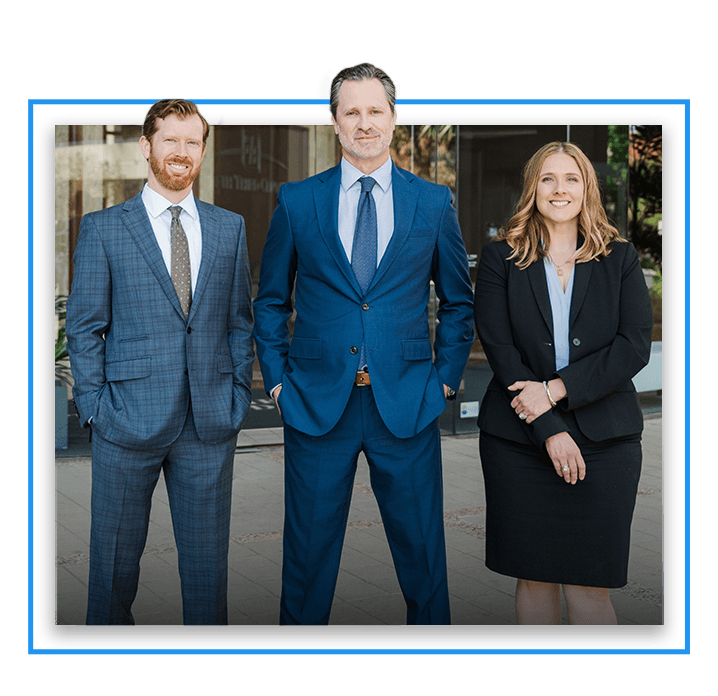
Uncontested Divorce for Tampa Senior Citizens
An uncontested divorce is one where couples file for the dissolution of a marriage on their own without the help of mediators or divorce lawyers. They decide how their marital and retirement assets will be divided.
This can be a cost-saving option for seniors going through a divorce in their senior years, also known as a “gray divorce.” But it can also leave partners vulnerable to the getting an unfair share of assets that they’ve worked so hard for. Having a Tampa senior citizen divorce lawyer on your side as you navigate your divorce hearing could be vital to ensure you receive your share of lifelong savings so that you have what you need in retirement.
Schedule a Consultation with a Tampa Senior Citizen Divorce Lawyer
If you are considering divorce as a senior citizen, an initial case evaluation with the team at Tampa’s Robert Sparks Attorneys provides you with vital information about the process ahead. Contact us to schedule a confidential consultation as soon as possible.
We can review the steps as they apply to your situation as a Tampa area resident. This no-obligation consultation ensures you are aware of your rights and thoroughly understand the divorce process with or without the courts getting involved.
Our experienced Tampa senior divorce attorneys utilize extensive knowledge of Florida divorce law to ensure our clients in their 50s, 60s, 70s, and beyond receive fair treatment and protect their retirement years. We fight to secure a positive outcome for our clients during such a difficult period in their lives.
Uncontested Divorce for Tampa Senior Citizens
An uncontested divorce is an option for older couples going through a divorce in Tampa and the surrounding area. This is also known as a “simplified dissolution of marriage.”
Couples decide how assets like bank savings will be split between the two parties. They’ll have to agree on how retirement and pension funds should be allocated. They may have to make tough decisions about how properties will be distributed, including who keeps the family home.
If retired couples can agree on these factors and others, they can file documents for an uncontested divorce. An uncontested divorce is usually completed without the aid of a divorce attorney or mediator. Couples will fill out the paperwork and file it with the closest circuit court clerk. Tampa is home to the 13th District Circuit Hillsborough County. You can also find divorce documents on their website.
Once the divorce documents are filed, couples usually have to wait 20 days to get a final divorce decree. After the waiting period, one of the partners would need to go into court for a short hearing so a judge can confirm that everything’s been done correctly.
An uncontested divorce can be relatively hassle-free, and save couples money on legal fees, but that same advantage can end up hurting your chances of building the life in retirement you desire. Signing a divorce agreement without a Tampa Senior Citizen Divorce Lawyer there to check over the fine print and the terms, can leave you with less than you were planning. A divorce agreement can leave one partner with far less than the other partner, whether intentionally or unintentionally.
How Do Senior Citizens Qualify for Florida’s Uncontested Divorce?
Senior citizens can file for an uncontested divorce in Florida, but they must meet some requirements to use the option.
In order to qualify for an uncontested divorce in Florida, you and your spouse must prove you meet several criteria:
- One of you must have been a Florida resident for six months or more.
- Agree that your marriage is beyond repair.
- Have no children under the age of 18, children who are still dependents, and neither you nor your spouse can be pregnant.
- Agree as to how all assets and liabilities will be divided.
- Neither you nor your spouse may seek alimony.
- Neither you nor your spouse can ask for financial information beyond what is available in the financial affidavits.
- Both you and your spouse must be willing to give up your rights to trial and to appeal the final decision.
- Both you and your spouse must be willing to sign the petition in the clerk’s office, not necessarily at the same time.
- Both you and your spouse must be willing to go to the final hearing together.
Couples coming out of a long-term marriage may not meet all of these requirements. If not, they can opt for a “regular dissolution of marriage.” This option will have more paperwork and will take a bit longer than a “simple dissolution of marriage,” but it still won’t require having an attorney.
The Pitfalls of an Uncontested Divorce for Seniors
Older couples seeking divorce must be cautious when considering these time-saving options. Couples going through a “gray divorce” have usually had longer to build assets, retirement funds, and collect possessions than younger couples.
These additional belongings can complicate the division of marital property and retirement savings. Trying to divide these assets on their own can shortchange one partner or another. Taking advantage of Florida law can help divorcing couples keep more of their own resources, but couples without legal help may not know about these important factors.
Speak with an Experienced Tampa Senior Citizen Divorce Lawyer
It’s understandable if you look over all the divorce options and still can’t decide what choice will leave you in the best shape as you rebuild your life in retirement. Talking with a Robert Sparks Divorce Attorney is your no-risk way to sort out the decision and figure out what option protects what you’ve built with your partner.
It’s important to know that you don’t have to face divorce alone. With decades of collective experience, our Tampa senior citizen divorce lawyers at Robert Sparks Attorneys have the knowledge of Florida divorce law you’ll need to fight for the best possible outcome in your settlement or court judgment.
Learn more about what we can do to help you by contacting us and scheduling a senior divorce consultation today. We protect those going through divorce in Tampa, St. Petersburg, Clearwater, Dade City, and the surrounding areas.

At our firm, we have a reputation built on winning. Our ultimate goal is to protect and pursue your rights and your family’s well-being. With decades of collective experience, we are highly qualified and committed to securing the best legal outcomes for individuals who need the skill, dedication, and compassion of our trial attorneys.

Strength. Trust. Results.
Read What Our Clients Say In Their Own Words.
-
“The professionalism of staff, the promptness of responses to questions, and the overall guidance through the process after my accident was astounding. Rob and Garrett were absolutely AMAZING.”- Daner J.
-
“I am very satisfied with the exceptional work that Robert Sparks Attorney has done for me and my case. Garrett Riley handled my case. I really appreciate how communicative and persistent he was.”- Alexis M.
-
“The communication with him and his team is fantastic, and you really feel they are with you every step of the way with your case. He is very caring and understanding, and takes initiative and leads the charge with moving your case along.”- Mary A.
-
“My cases both had successful outcomes and I am certain that this as a result of his knowledge and work ethic. His attention was primarily focused on my health and well being prior to anything else.”- Melissa E.
-
“Although, I have to put a special highlight on Cheryl! She is one of the sweetest and most compassionate people I know. She truly cares about their clients as if they were friends and had know each other for years.”- Nicole S.
-
“It was non-stop communication with both Rob and Cheryl. The road was long but this team is adamant and steadfast on their mission and dedication to each client.”- Michelle N.
-
“Rob, thank you so much for helping with all of this and know that I hold you and your staff in the highest professional esteem. No matter what was thrown at us, you had an answer that countered.”- Former Client
-
“Our family cannot begin to express appreciation for the legal expertise provided by attorney Robert Sparks and his team at Robert Sparks Attorneys!”- Former Client
